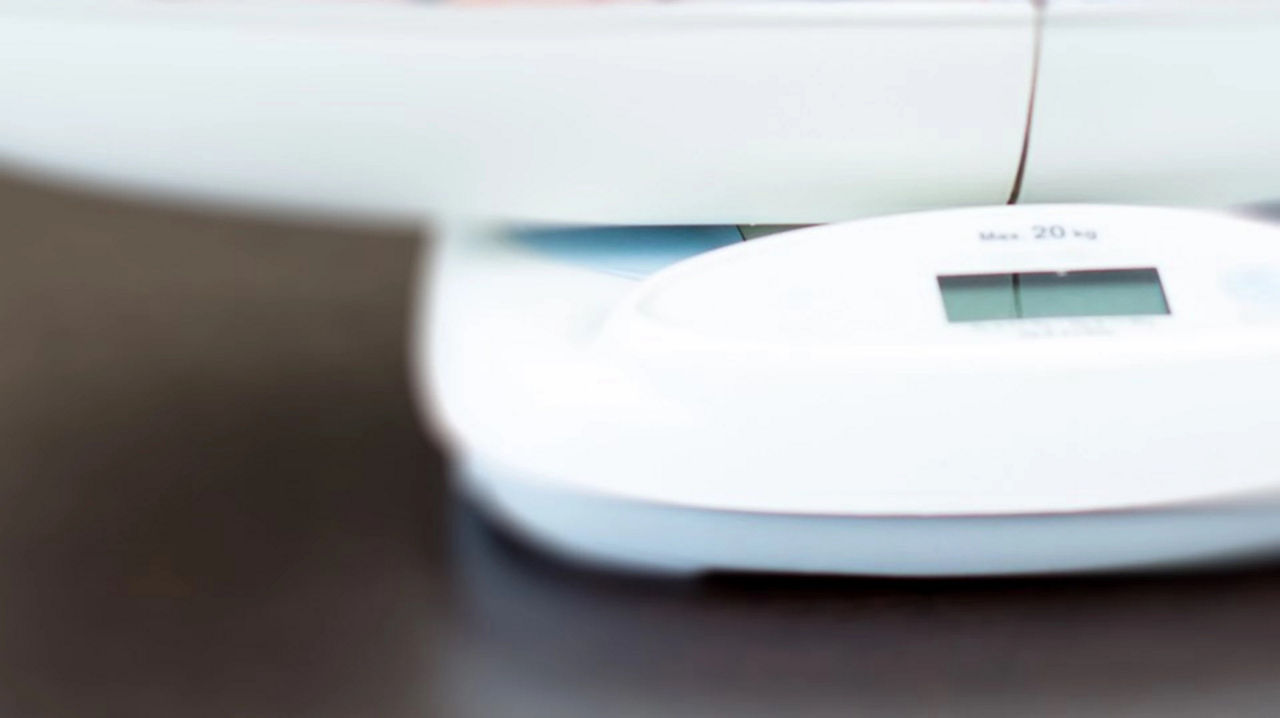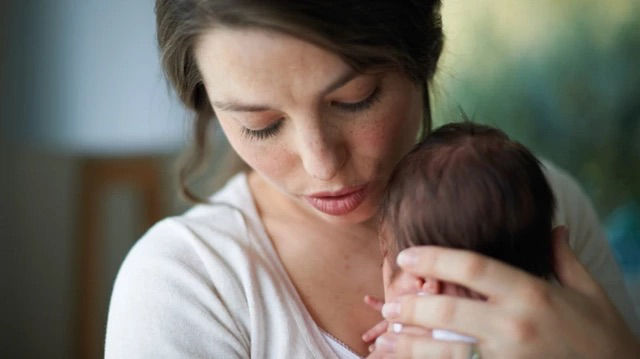From how often your baby will be weighed to our handy baby weight chart, learn what to expect from your baby’s growth.
Average baby weight

There’s a lot of information about ‘average baby weight’ and BMI and an abundance of baby growth charts and discussions around percentiles. However, the average weight of a newborn baby can vary greatly.
To provide you with the help and guidance you need, you’ll find lots of information on everything from the average baby weight and how often your little one should be weighed to how much you can expect your baby to grow during their first year.
Get the support you need for every step of your parenting journey.
What is the average baby weight of a newborn in the UK?
During 2023-2024, 85% of babies who had their weight recorded in England weighed anywhere between 2.5 and 3.9kg at birth1. Only 7% of babies recorded had a low birthweight of less than 2.5kg1.
There are many factors that can influence how much your baby weighs at birth, including1
- Your health during pregnancy (including your diet and nutrition).
- Whether or not your baby was premature or overdue.
- Genetics - the physical build of both biological parents.
Babies come in all shapes and sizes, just like their parents, so it’s important not to compare your baby to others. If you've got any concerns about your baby’s weight, always speak to your GP, who can put your mind at rest.
How often are babies weighed?
Your baby will likely be weighed very soon after birth, once the midwife has checked that your baby is OK and you’ve had some skin-to-skin contact if that’s what you’ve chosen to do in your birth plan2.
During the first two weeks after their arrival, your baby will be weighed to ensure they’re gaining weight as they should.
After this, they’ll be weighed3:
- Once a month up to 6 months of age.
- Once every two months from 6 to 12 months of age.
- Once every three months over the age of 12 months.
Your baby is unlikely to be weighed more regularly than this unless there are concerns about your baby’s weight and growth. If your baby is growing and gaining weight, that’s a good sign that everything’s as it should be.
It’s very important for you to attend all of your baby’s scheduled clinic appointments, and that you speak with your midwife or GP if you’ve got any concerns at all about your baby’s weight gain, growth and development.
The ‘red book’
Every time your baby is weighed, the results will be recorded in your baby’s personal child health record (PCHR). You’ll probably come to know this more commonly as the ‘red book’.
The PCHR contains lots of information about your baby’s growth and development, immunisations, and where to seek support if you need it. The PCHR also contains your baby’s weight chart to make sure your baby’s growth and weight are on the right track. “It felt like a really significant moment when I got the red book”, says Sylvie’s mum, “it was really handy for keeping records of appointments, and it was nice to see my baby’s progress as they got bigger. I’m going to keep it and put it in my daughter’s box of memories.”
How your baby’s growth is measured
Here in the UK, health professionals use the UK-WHO (World Health Organization) growth charts to measure your baby’s weight and height development.
Although based on breastfed babies, the World Health Organization charts are used for all babies, even if they’re formula-fed.
Your baby’s weight chart and the baby weight percentile
| Age | 50th centile weight for baby boys | 50th centile weight for baby girls |
|---|---|---|
Birth | 3.5 kg (7.8lbs) | 3.4 kg (7.8lbs) |
1 month | 4.4 kg (9.7lbs) | 4.2 kg (7.8lbs) |
2 months | 5.2 kg (11.5lbs) | 4.8 kg (10.5lbs) |
3 months | 6 kg (13.2lbs) | 5.4 kg (12lbs) |
4 months | 6.7 kg (14.8lbs) | 6.2 kg (13.7lbs) |
5 months | 7.4 kg (16.3lbs) | 6.7 kg (14.7lbs) |
6 months | 7.9 kg (17.4lbs) | 7.2 kg (15.8lbs) |
7 months | 8.4 kg (18.5lbs) | 7.7 kg (17lbs) |
8 months | 8.9 kg (19.6lbs) | 8.1 kg (18lbs) |
9 months | 9.3 kg (20.5lbs) | 8.5 kg (18.7lbs) |
10 months | 9.7 kg (21.4lbs) | 8.8 kg (19.4lbs) |
11 months | 10 kg (22lbs) | 9.2 kg (20.3lbs) |
12 months | 10.3 kg (22.7lbs) | 9.5 kg (21lbs) |
Your baby’s weight and growth are measured using what’s known as a centile chart. It measures three things4:
- Weight.
- Length.
- The circumference of your baby’s head.
A centile chart shows the growth pattern that healthy children typically follow, whether breastfed, formula-fed or combination-fed. There are different charts for boys and girls. That’s because, in general, boys tend to be a little heavier and have growth patterns that are different from those of girls.
Babies born before 37 weeks of pregnancy will follow a different chart until two weeks after their original due date. After that, the standard boy/girl charts will be used, applying what’s known as a correction factor (this just means that the plot is adjusted for how many weeks early your baby was born)4.
Baby weight charts - what does it all mean?
The growth centiles on a baby weight chart show the average weight gain for babies of different ages, with the 50th percentile being the average weight for an infant (median) across the population. You’ll recognise them as the curved lines on the chart in your red book.
Don’t be too concerned if your baby starts at the top or bottom of the baby weight chart - this doesn’t mean they are over or underweight. The baby weight chart is a guide to your baby’s individual weight gain, and every baby will have their own growth chart in their red book
However much your baby weighs, your health visitor will look for a steady weight gain between appointments along your baby’s centile on the growth chart.
Growth charts can be overwhelming and, sometimes, confusing. The main thing to remember is that if your healthcare professional is happy with your baby’s growth and weight gain, there’s nothing for you to be concerned about.
Will my baby always follow the same centile on their baby weight chart?
Your baby’s weight and height may not always follow the same centile line, and that’s OK - it’s not unusual for the measurement to go down or up by one centile3.
However, it’s less common for your baby’s measurements to change by two centiles. If that happens, have a chat with your doctor or health visitor3.
Remember that all babies are different – even siblings. Try not to compare your baby to others and focus on enjoying how much they’re growing and changing every day.
How much weight should a baby normally gain?
You’ll see your baby grow most rapidly in the early months of their life, a theme that will continue throughout their first year; “That first year really is a whirlwind of growth”, says Seb’s mum, “One minute I was holding this tiny, fragile baby, the next I had a more sturdy, bouncy six-month-old who was desperate to be on the move. Watching him grow has been amazing.”
By the time they’re six months old, your baby is likely to weigh twice as much as they did at birth. Usually, your baby will gain most of their weight between six and nine months of age. Their growth will then gradually slow down as they become more active as toddlers - get ready to keep up!
Factors affecting baby weight
From baby weight loss after birth to growth spurts and becoming more active, take a look at some of the things that might have an impact on your baby’s weight.
Baby weight loss after birth
It’s normal for babies to lose weight in the first few days following their birth. Breastfed babies tend to lose anywhere between 5 and 7% of their birth weight, whilst formula-fed babies usually lose around 3 or 5%5.
Most babies stop losing weight within three or four days of being born. Within three weeks, your baby will likely have regained their birth weight or weigh more than they did at birth3 and will be more used to breast or bottle-feeding regularly.
If your baby isn’t back up to their birth weight by this time or loses more than 8% of their birth weight, your midwife or health visitor will offer additional support to help with feeding and baby weight gain5.
Weaning
If your baby has started weaning, you might notice that their weight fluctuates. This might especially be the case if your baby doesn’t take to solid foods straight away6.
Usually, a little time and a little patience go a long way on the weaning journey, so keep offering your baby a variety of different foods alongside their usual milk feeds. If you’re still concerned about how much they’re eating, speak to your GP or health visitor.
Want to know more about weaning?
Illness
You baby might lose some weight if they’re not feeling so well, especially if they’ve had a tummy bug that’s caused vomiting and/or diarrhoea7, 8. If your baby has reflux, this might also be a reason for them to lose weight9, 10, 11, 12. Always contact your HCP and discuss any of these changes with them so that they can advise you on next steps.
Growth spurts
Is your baby hungrier than usual and starting to outgrow their outfits? If so, they could be going through a growth spurt. Growth spurts can last for a few days and can happen pretty regularly during the first year of life. Expect them at around 10 days, 5-6 weeks, and 3, 6, 9 and 12 months13.
What if my baby isn't gaining weight
If your baby isn’t gaining weight, this can sometimes be a sign that there’s a medical issue. That’s why your baby’s weight will be carefully monitored during the first couple of months after their birth, to make sure that they’re developing healthily and growing as they should.
Rest assured that if your baby loses weight or isn’t back up to their birth weight within a certain time frame, your GP or other medical professional will be on hand to provide the help, advice and support that you need.
- NHS England. NHS Maternity Statistics, England 2019-20 [online 2024]. Available at http://digital.nhs.uk/data-and-information/publications/statistical/nhs-maternity-statistics/2019-20/births. [Accessed February 2025]
- NHS. What happens straight after the birth? [online 2022]. Available at https://www.nhs.uk/pregnancy/labour-and-birth/after-the-birth/what-happens-straight-after/. [Accessed February 2025]
- National Health Service (NHS). Your baby’s weight and height [Online 2023]. Available at: https://www.nhs.uk/conditions/baby/babys-development/height-weight-and-reviews/baby-height-and-weight/. [Accessed February 2025]
- RCPCH. Growth charts - information for parents and carers [online]. Available at https://www.rcpch.ac.uk/resources/growth-charts-information-parents-carers. [Accessed February 2025]
- NHS Sherwood Forest Hospitals NHS Foundation Trust. Neonatal weight loss in the first 6 weeks [online 2021]. Available at https://www.sfh-tr.nhs.uk/media/11934/pil202109-01-nwl-neonatal-weight-loss-in-the-first-six-weeks.pdf. [Accessed February 2025]
- NICE. Faltering growth: what causes it? [online 2023]. Available at https://cks.nice.org.uk/topics/faltering-growth/background-information/cause/. [Accessed February 2025]
- Richard SA, Black RE, Gilman RH, Guerrant RL, Kang G, Lanata CF, Mølbak K, Rasmussen ZA, Sack RB, Valentiner-Branth P, Checkley W; Childhood Malnutrition and Infection Network. Diarrhea in early childhood: short-term association with weight and long-term association with length. Am J Epidemiol. 2013 Oct 1;178(7):1129-38. doi: 10.1093/aje/kwt094. Epub 2013 Aug 21. PMID: 23966558; PMCID: PMC3783094.
- HSE. Your child's weight [online 2022]. Available at https://www2.hse.ie/babies-children/checks-milestones/physical-development/weight/. [Accessed February 2025]
- NICE. Faltering growth: what causes it? [online 2023]. Available at https://cks.nice.org.uk/topics/faltering-growth/background-information/cause/. [Accessed February 2025]
- NHS Alder Hey Children’s NHS Foundation Trust. Vomiting baby [online 2023]. Available at https://www.alderhey.nhs.uk/conditions/symptoms-checker/vomiting-baby/. [Accessed March 2025]
- Macknin ML, Piedmonte M, Jacobs J, Skibinski C. Symptoms associated with infant teething: a prospective study. Pediatrics. 2000 Apr;105(4 Pt 1):747-52.
- Wuni A, Iddrisu M, Angliengmene AA, Salia SM, Chanayireh L, Mohammed IS, Musah A, Ibrahim MM, Kpentey AA, Kwarteng C, Nyarko BA, Doat AR. Knowledge and management practices of infant teething symptoms among mothers in a tertiary facility in Ghana. Pan Afr Med J. 2024 Feb 13;47:65. doi: 10.11604/pamj.2024.47.65.40792. PMID: 38681109; PMCID: PMC11055185.
- NHS University Hospitals of Leicester. Feeding your baby [online]. Available at https://www.leicestershospitals.nhs.uk/aboutus/departments-services/maternity/leicester-maternity-services/after-the-birth/feeding-your-baby/#:~:text=Babies%20will%20have%20'growth%20spurts,grow%20does%20not%20fit%20anymore%3F. [Accessed February 2025]
Last reviewed: October 2025
Reviewed by Nutricia’s Medical and Scientific Affairs Team
Related articles

Need some help?
You can get quick answers to common questions in our FAQs.
Alternatively, if you need help with general pregnancy or baby advice, or maybe on using or ordering our products - our expert team are always on hand to talk about feeding your baby.



?ts=1701285595274&dpr=off)